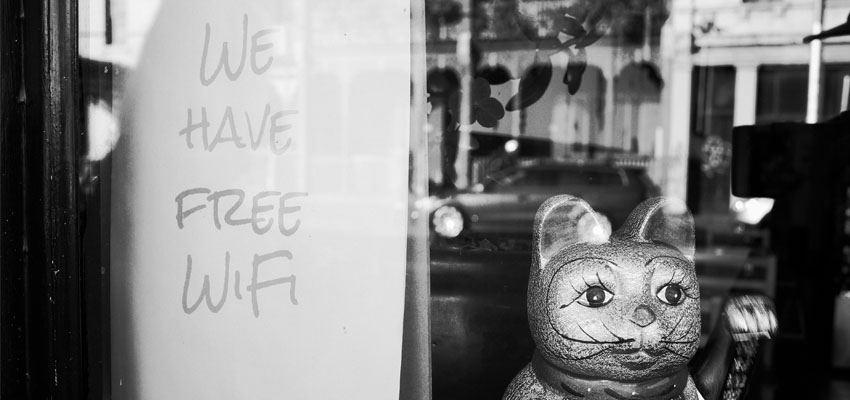Can a WiFi Owner See What Sites I Visit?

WiFi is extremely convenient and always there when you need it.
But at one point or another, you probably asked yourself: “Can a WiFi owner see what sites I visit?”
You probably won’t like the answer to that. Here’s all you need to know:
“So, Can WiFi Owners See What Sites I Visit?”
Yep, they sure can.
If you’re browsing HTTPS websites, they’ll only be able to see the websites you’re browsing, not the content you’re checking out.
So, if you were to access Gmail, the WiFi admin would only know you’re accessing Gmail. They wouldn’t know what emails you’re reading.
If you access an HTTP website, though, things change. Since there is no encryption, a WiFi owner could use a packet sniffer (like Wireshark) to reassemble your data packets. If they do that successfully, they can see what web pages and content you browsed.
Oh, and check this out - if your workplace or school campus uses an IDS (Intrusion Detection System) that is SSL-aware, the IT team could theoretically break SSL traffic by intercepting requests with their own certificate issuing system. If that happens, the IT team can monitor all your traffic.
And here’s another thing - some routers actually keep logs of the IP addresses you visit on the network. The WiFi admin just has to check the logs to see what you browsed for in that case.
What Can a WiFi Administrator See, Exactly?
Here’s a list of the kind of info WiFi owners might see when you use their networks:
- The name of every website you visit;
- The address of companies that are displaying ads to you;
- What web pages you visit, what files you access, and what content you download (if you browse HTTP websites);
- When you connect to the web;
- How long you stay online;
- How much time you spend on certain websites;
- People you had Internet calls with;
- People you exchanged online text messages with;
- The contents of your messages if you use an unencrypted messaging platforms;
- What apps you use, how often you use them, and when you use them.
Overall, pretty similar to what your ISP sees.
Can Hackers See What You Do on WiFi?
Usually, yes.
It really depends whether or not the WiFi network uses any encryption. If it doesn’t, cybercriminals have free reign to spy on your online communications.
However, the bad news is that even if the network uses encryption, your traffic still isn’t safe.
Why?
Because the current security standard (WPA2) for WiFi has some serious issues. And not even the successor (WPA3) is free of flaws.

So, hackers might be able to break your encrypted WiFi traffic if they’re good enough.
Plus, get this - cybercriminals can actually set up fake WiFi hotspots using devices like the WiFi Pineapple. If you connect to such a network, the hacker can easily see everything you do online - even if you browse HTTPS websites.
Does Incognito Mode Stop WiFi Admins from Monitoring Your Traffic?
Nope, not at all.
Here’s the thing about incognito mode (or any of its equivalents) - it’s just meant to hide your online browsing from people who use the same device as you. That’s why it doesn’t keep so many cookies, and why it automatically erases your browsing history when you exit the browser or tab.
However, incognito mode won’t hide your online traffic at all. Network admins, ISPs, and hackers can easily spy on all your online communications if they want to.
The Best Way to Protect Your Privacy - Use a VPN
If you worry about WiFi admins keeping a close eye on what you do online, just use a VPN every time you connect to a network.
If you’re not familiar with VPNs, they are online services that hide your IP address and Internet traffic. Basically, a VPN establishes an encrypted tunnel between your device and its servers. Nobody can monitor the data that goes through that tunnel.
And here’s the best part - a VPN will protect your privacy even if you use unsecured WiFi networks that hackers spy on, or if you accidentally connect to a fake cybercriminal-run WiFi hotspot. Of course, you should use antivirus/antimalware protection too.
At most, a network admin or hacker will only see the following:
- That you are using a VPN (they’ll see the IP address of the server).
- How long you use the VPN.
- How much data you send and receive.
DNS Leaks Can Get in the Way, Though
If you just pick a VPN at random, and don’t take the time to make sure it’s a reliable service, you might end up dealing with DNS leaks.
That’s basically when your DNS queries (what you look up online) leak out of the VPN tunnel. So, the WiFi admin ends up being able to see what you browse online even if you’re using a VPN.
Luckily, you can avoid this problem by just testing your VPN connections with a website like DNSLeakTest.com. Using a VPN that has built-in DNS leak protection also helps.
Looking for a reliable VPN service?
Here at SmartyDNS we offer high-speed VPN servers with military grade 256-bit AES encryption and highly secure VPN protocols (OpenVPN, SoftEther and IKEv2), and we we adhere to a strict no-log policy.
Our VPN servers act as proxy servers and we also offer Smart DNS service that allows you to unblock 300+ geo-restricted websites around the world.
We offer convenient VPN apps for Windows, Mac, iPhone / iPad, Android and Fire TV / Stick, and extensions for Chrome and Firefox browsers.
Special offer! Get SmartyDNS for $ 3.7 per month!
Yes, and we’ll also get your 30-day money-back guarantee.
Can WiFi Owner See What Sites I Visit? The Bottom Line
To make a long story short, yes, they can.
What can a WiFi administrator see, though?
Well, if you visit HTTP websites, WiFi admins can see what content you watched or read. If you browse HTTPS websites, they’ll still know what websites you browsed.
And so will anyone else who spies on your WiFi traffic - like hackers, for example.Luckily, you can solve that problem by using a VPN. It will encrypt all your traffic, making it 100% surveillance-proof.



